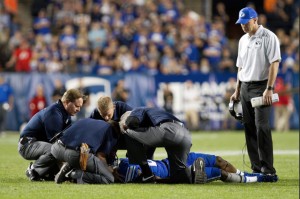The controversial targeting foul recently instituted by the NCAA is aimed at reducing concussions and spinal injuries of offensive players. A defensive player flagged for targeting will be ejected from the game, suspended for at least another half following the game, and the team is then a assessed a 15-yard penalty, giving the opposing team an automatic first down.

Coaches, players and fans alike think the rule seems a little steep.
“At the beginning of the year, they showed a video from the NCAA,” junior defensive back Skye Povey said of the BYU football coaching staff. “It talked about how this year, if you target a helmet, you will be ejected.”
Last season, one targeting call and ejection was made for every 12.5 games played in the league. Putting the calls into perspective for this season, six targeting fouls were called during week one of the 2013 college football season.
All-American wide receiver Cody Hoffman was the beneficiary of such a call during the Boise State game, when replays appeared to show the shoulder or helmet of Boise State safety Dillon Lukehart making contact with Hoffman’s head.
The increase in targeting enforcement has many arguing it will only result in unnecessary ejections, wasteful 15-yard penalties and an increase in leg injuries.
Comments made by Washington Redskins safety Brandon Meriweather raised the level of concern as to the mentality of hard-hitting defensive players on both the professional and college levels of football.
“To be honest, you’ve got to go low now,” Meriweather told the Associated Press. “You gotta end people’s careers. You gotta tear people’s ACLs. Mess up people’s knees. You can’t hit them high anymore. You’ve just got to go low.”
Jeff Hurst, head athletic trainer for the BYU football team, said targeting enforcement has not had a significant effect on the types and frequencies of injuries he has seen this season.
“There hasn’t been significantly more or significantly less injuries,” Hurst said in reference to head injuries.
Hurst, who has assisted the BYU football team since 2006, also mentioned there hasn’t been an increase of leg injuries.
Luckily for a program that strives to represent all things good, BYU defensive players have not had a problem with targeting calls and being overly aggressive this season, thanks to the coaching staff.
“We talked to the guys about it at the beginning of the year,” said BYU linebackers coach Kelly Poppinga. “(We’re) just making sure when they’re going to make a tackle, that they’re hitting below the neck and below the shoulder. For us, we haven’t really had anything happen to us.”
Poppinga said head coach Bronco Mendehall’s philosophy is that tackling can’t be taught. Players are born with the ability to tackle.
If players are born with the ability to tackle, how does targeting enforcement affect something Mendenhall believes cannot be learned?
“It changes the approach everybody has to tackle; otherwise you’ll get kicked out of the game, “ said senior defensive back Mike Hague.
Hague said the concerns many college players have regarding the changes they’ve made in their personal approach to the game were pretty unique.
“A lot of people say that they’re not letting us play football anymore,” he said. “It has definitely changed the way we play defense because you grow up just trying to hit people as hard as you can. You need good fundamentals.”
Hague, a Salt Lake City native, has moved away from relying purely on instincts and training and diving in to make a play.
“You’re a lot more cautious in the way that you approach a tackle, and it makes you super careful when you’re going to make a tackle,” Hague said.
Although Hague’s approach and playing style have changed, the safety of his teammates on the offensive end of the ball and the accountability offensive players are held to regarding helmet-to-helmet contact make him feel good.
For players like Skyler Ridley, running routes and leaping to catch passes from quarterback Taysom Hill, targeting enforcement doesn’t have the same effects as it has on defensive players.
“The game is so fast, and you’re not really thinking about that when you’re running over the middle as a receiver,” said Ridley, a senior wide receiver. “I’ve always been a smaller guy and have enjoyed showing my toughness through hitting people.”
Like many other players who thrive off the physical aspect of the game, Ridley has his own opinions about the NCAA’s efforts to crack down on high hits.
“I’ve disagreed (with) the way that they’ve handled calls, especially suspensions,” said Ridley in reference to player ejection and the 15-yard penalty tacked on to the end of the play. “I think that’s a severe penalty to a guy who’s just reacting.”
Ridley, who was suspended for a half for a targeting block against the Houston Cougars, recognizes helmet-to-helmet contact is part of the game and is, at times, unavoidable.
“Sometimes it’s not intentional,” Ridley said. “The offensive player may turn one way, and the defensive player may not be able to react quickly enough.”




